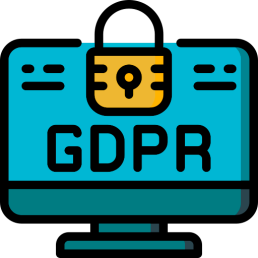GDPR Compliance Experts at Your Service
Personal data protection is a critical concern for organizations of all sizes. The General Data Protection Regulation (GDPR) is the EU’s comprehensive data protection law that sets strict standards for the protection of personal data. Compliance with the GDPR is mandatory for all organizations operating within the EU and can result in significant fines for non-compliance.
Our GDPR compliance services provide a complete solution for organizations looking to comply with the GDPR. Our team of experienced cybersecurity experts has a deep understanding of the GDPR and will work with you to assess your current security posture, identify any gaps, and implement the necessary security controls and processes to ensure compliance.
Contact us today to learn more about our services and how we can help your organization comply with the GDPR.
Our Offering
Gap Analysis

We will identify areas where an organization is not compliant with GDPR to make recommendations on how to improve the position.
Data Inventory

We assist our customers in creating an inventory of all personal data processed and mapping how that data flows through their systems.
DPIA

Data protection impact assessments (DPIAs) help identify and mitigate privacy risks associated with new or changed processing activities.
PIA

Privacy Impact Assessment helps our customers identify and mitigate the risks associated with processing personal data.
Privacy Notices

We will help create clear and concise privacy notices and consent mechanisms that comply with GDPR requirements.
Policies & Procedures

We help develop comprehensive policies and procedures for data privacy: data retention, data security, and breach notification.
Data Subject Access Requests

We help customers create processes for handling data subject access requests (DSAR) and provide guidance on how to respond to them.
Training & Awareness

We will provide GDPR training to the team handling personal data to ensure they know obligations and how to comply with GDPR.
Cybersecurity Solutions
We will provide guidance on technical and other measures to protect personal data from unauthorized access, disclosure, or loss.
Vendor Management

We help our customers assess the GDPR compliance of their third-party data processors and provide guidance on how to manage vendor risk.
GDPR Audit

We can conduct an independent audit and confirm if the policies, procedures, processes of our customers are in compliance with GDPR.
DPO

We will outsource Data Protection Officer and EU Data Protection Representative Service to the companies with offices outside the EU.
GDPR Related Risks
There are several dangers associated with being non-GDPR compliant. Some of the typical dangers include:
- Fines and Penalties: Non-compliance with the GDPR can result in significant fines and penalties. Depending on the nature of the violation, fines can be as high as 4% of the organization’s annual global revenue or €20 million, whichever is greater.
- Reputational Damage: Non-compliance with the GDPR can damage an organization’s reputation. Consumers are increasingly concerned about the privacy of their personal data, and a data breach or other violation can erode trust in an organization’s ability to protect that data.
- Legal Action: Non-compliance with the GDPR can result in legal action from data subjects, regulators, or other stakeholders. Data subjects have the right to bring legal action against organizations that violate their rights under the GDPR, which can result in additional costs and reputational damage.
- Loss of Business Opportunities: Non-compliance with the GDPR can result in the loss of business opportunities. Many organizations require their suppliers and partners to be GDPR compliant, and non-compliant organizations may be excluded from these opportunities.
- Increased Operational Costs: Non-compliance with the GDPR can result in increased operational costs. Organizations may need to invest in new systems, processes, and staff to achieve compliance, which can be costly and time-consuming.
The dangers of being non-GDPR compliant can be significant. Organizations that fail to comply with the GDPR risk fines, reputational damage, legal action, and loss of business opportunities. Achieving GDPR compliance is essential for organizations that process personal data to protect their customers’ privacy and avoid these risks.
GDPR Compliance Project
The stages of a GDPR compliance project can vary depending on the scope of the project and the needs of the organization. However, some common stages of a GDPR compliance project may include:
- Scoping: This stage involves defining the scope of the GDPR compliance project. It includes identifying the data processing activities that are within the scope of the GDPR and determining the level of compliance that needs to be achieved.
- Data Inventory and Data Mapping: This stage involves identifying and documenting the personal data that the organization collects, processes, and stores. It includes identifying the types of data, the sources of data, the purposes of processing, the retention periods, and the categories of data subjects.
- GDPR Gap Analysis: This stage involves conducting an analysis of the organization’s GDPR compliance status. It includes reviewing policies, procedures, and data processing activities to identify areas of non-compliance.
- Privacy Impact Assessment (PIA): This stage involves conducting a risk assessment of the organization’s data processing activities. It includes identifying the risks associated with the processing of personal data and recommending measures to mitigate those risks.
- GDPR Policies and Procedures: This stage involves developing and implementing policies and procedures to comply with the GDPR. It includes developing a Data Protection Policy, a Data Breach Response Plan, a Vendor Management Policy, and other relevant policies and procedures.
- GDPR Training and Awareness: This stage involves training employees on the GDPR requirements and best practices for data protection. It includes developing e-learning modules, presentations, and other training materials.
- GDPR Audit: This stage involves conducting an independent assessment of the organization’s GDPR compliance status. It includes identifying areas for improvement and making recommendations for remediation.
Overall, the stages of a GDPR compliance project are designed to help organizations achieve compliance with the GDPR and protect the personal data of data subjects. They provide a roadmap for achieving compliance, identify areas for improvement, and demonstrate a commitment to data protection.
Our Benefits
Top Certifications
Our experts possess certifications, such as CISSP, CISA, CISM, CRISC, and others essential GDPR compliance projects.
Rich Deliverables
Our experts provide policies, procedures, assessments, gap analyses, as well as other documents and deliverables required for GDPR compliance.
Best Methodologies
Our experts conduct GDPR compliance projects using best practices and industry standard methodologies.
Cost Efficiency
One of our key advantages is the access to top talents with many years of experience in demanding environments at affordable costs.
Deliverables
The deliverables of a GDPR compliance project can vary depending on the scope of the project and the needs of the organization. However, some typical deliverables of a GDPR compliance project may include:
- Risk Management Plan: GDPR Gap Analysis Report: This report identifies areas where an organization is not in compliance with the GDPR and provides recommendations on how to achieve compliance.
- Data Inventory and Data Mapping Report: This report documents the personal data that the organization collects, processes, and stores. It identifies the types of data, the sources of data, the purposes of processing, the retention periods, and the categories of data subjects.
- Privacy Impact Assessment (PIA) Report: This report identifies the risks associated with the processing of personal data and recommends measures to mitigate those risks.
- GDPR Policies and Procedures: These are the policies and procedures that the organization must adopt to comply with the GDPR. They typically include a Data Protection Policy, a Data Breach Response Plan, a Vendor Management Policy, and other relevant policies and procedures.
- GDPR Training and Awareness Materials: These materials are used to train employees on the GDPR requirements and best practices for data protection. They may include e-learning modules, presentations, and other training materials.
- GDPR Audit Report: This report provides an independent assessment of the organization’s GDPR compliance and identifies areas for improvement. It may also include recommendations for remediation.
- GDPR Certification: This is a formal certification that the organization has achieved GDPR compliance. It can be used to demonstrate to customers and stakeholders that the organization takes data protection seriously and is committed to complying with the GDPR.
The deliverables of a GDPR compliance project are designed to help organizations achieve compliance with the GDPR and protect the personal data of data subjects. They provide a roadmap for achieving compliance, identify areas for improvement, and demonstrate a commitment to data protection.
Our Recognition















